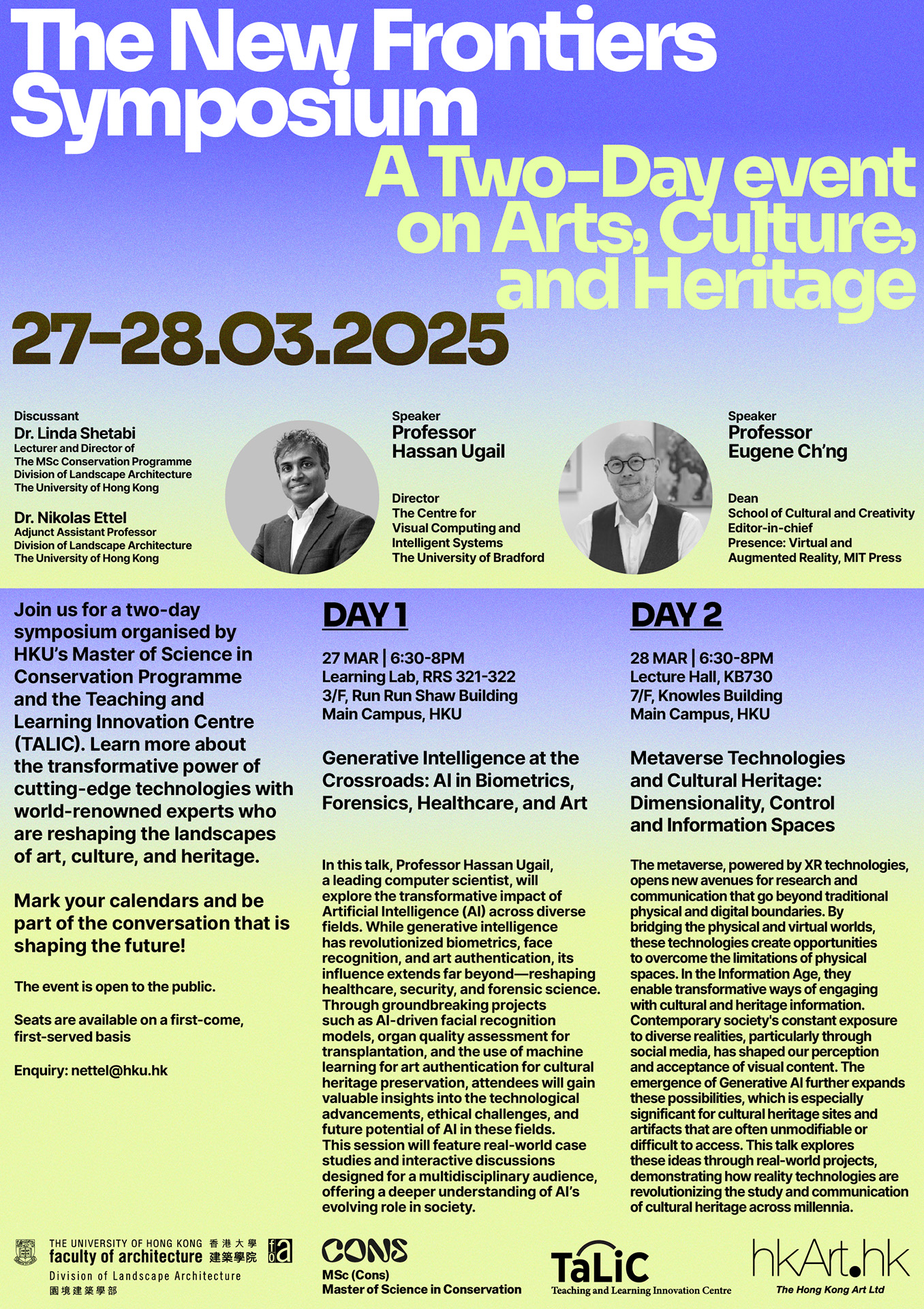
Organised by HKU’s Master of Science in Conservation Programme and the Teaching and Learning Innovation Centre (TALIC)
Details of the Event:
Date : 27 – 28 Mar 2025 (Thu – Fri)
Time : 6:30pm – 8:00pm (HKT)
Venue:
Learning Lab (RRS 321 & 322 Run Run Shaw Building, Main Campus, HKU) [organized by Teaching and Learning Innovation Centre on Thursday, 27 March 2025]
Lecture Hall, KB730, 7/F, Knowles Building, Main Campus [organized by Master of Science in Conservation Programme on Friday, 28 March 2025]
Abstract
Join us for a two-day symposium organised by HKU’s Master of Science in Conservation Programme and the Teaching and Learning Innovation Centre (TALIC). Learn more about the transformative power of cutting-edge technologies with world-renowned experts who are reshaping the landscapes of art, culture, and heritage. Mark your calendars and be part of the conversation that is shaping the future!
[27 Mar 2025] Day 1 (Registration is required) - Generative Intelligence at the Crossroads: AI in Biometrics, Forensics, Healthcare, and Art
Generative Intelligence at the Crossroads: AI in Biometrics, Forensics, Healthcare, and Art
Date : 27 Mar 2025 (Thu)
Time : 6:30pm – 8:00pm (HKT)
Venue : Learning Lab (RRS 321 & 322 Run Run Shaw Building, Main Campus, HKU)
Speaker : Professor Hassan Ugail, Director of the Centre for Visual Computing and Intelligent Systems at the University of Bradford
Discussants :
- Dr. Linda Shetabi, Lecturer and Director of the MSc Conversation Programme Division of Landscape Architecture, the University of Hong Kong
- Dr. Nikolas Ettel, Adjunct Assistant Professor, Division of Landscape Architecture, the University of Hong Kong
Abstract
In this talk, Professor Hassan Ugail, a leading computer scientist, will explore the transformative impact of Artificial Intelligence (AI) across diverse fields. While generative intelligence has revolutionized biometrics, face recognition, and art authentication, its influence extends far beyond—reshaping healthcare, security, and forensic science. Through groundbreaking projects such as AI-driven facial recognition models, organ quality assessment for transplantation, and the use of machine learning for art authentication for cultural heritage preservation, attendees will gain valuable insights into the technological advancements, ethical challenges, and future potential of AI in these fields. This session will feature real-world case studies and interactive discussions designed for a multidisciplinary audience, offering a deeper understanding of AI’s evolving role in society.
About the Speaker
Professor Hassan Ugail, Director of the Centre for Visual Computing and Intelligent Systems at the University of Bradford, is a distinguished computer scientist specializing in visual computing and artificial intelligence (AI). He champions the application of AI to address real-world challenges in digital health, innovative engineering, and sustainable societies. His primary research focuses on human biometrics, particularly the development of advanced AI solutions for facial recognition and analysis. Notably, his work contributed to identifying the two Russian spies involved in the Salisbury Novichok poisoning case, a major international story in 2018. In 2023, Professor Ugail was a presenter at the 199th Royal Institution Christmas Lecture, where he showcased the role of AI in facial recognition. The Royal Institution Christmas Lecture, held in London, has a storied history dating back to 1825, with Michael Faraday—known as the father of electricity—delivering the inaugural lecture.
About the Discussants
Dr. Linda Shetabi is a Lecturer and the Director of the MSc Conservation Programme at the Division of Landscape Architecture at the University of Hong Kong. Dr. Shetabi’s research interests include the role of heritage conservation in achieving the UN 2030 Agenda on Sustainable Development and its contributions to the Sustainable Development Goals (SDGs). She is the co-author of the ICOMOS (International Council on Monuments and Sites) Heritage and the Sustainable Development Goals: Policy Guidance for Heritage and Development Actors. As a member of the ICOMOS SDG Working Group, her projects include the ICOMOS SDGWG Webinar Series on heritage and the sustainable development goals, collaboration with the NGO Major Group for the UN High-Level Political Forum, and the preparation of the ICOMOS Policy Guidance Manual.
Dr. Nikolas Ettel is an intermedia researcher and Adjunct Assistant Professor in HKU’s Division of Landscape Architecture, where he coordinates the Faculty Interdisciplinary Courses and teaches the Common Core Course 24 Frames: Communicating Ideas through Film. He is the director of Infinite Frames: Students’ Short Film Festival, an annual event at Tai Kwun, to promote dialogue and collaboration among talented students and film scholars from around the world. His Hong Kong-based studio ZweixZwei Ltd. explores the creative use of emerging technologies to innovate visual storytelling by digitising cultural heritage. The work has been exhibited at PMQ, City Gallery, the Hong Kong Pavilion for the 2021 Venice Architecture Biennale, among other venues.
[28 Mar 2025] Day 2 (All Welcome and no registration is required) - Metaverse Technologies and Cultural Heritage: Dimensionality, Control and Information Spaces
Metaverse Technologies and Cultural Heritage: Dimensionality, Control and Information Spaces
Date : 28 Mar 2025 (Fri)
Time : 6:30pm – 8:00pm (HKT)
Venue : Lecture Hall, KB730, 7/F, Knowles Building, Main Campus, HKU
Speaker : Professor Eugene Ch’ng, School of Cultural and Creativity Editor-in-chief Presence: Virtual and Augmented Reality, MIT Press
Discussants :
- Dr. Linda Shetabi, Lecturer and Director of the MSc Conversation Programme Division of Landscape Architecture, the University of Hong Kong
- Dr. Nikolas Ettel, Adjunct Assistant Professor, Division of Landscape Architecture, the University of Hong Kong
Abstract
The metaverse, powered by XR technologies, opens new avenues for research and communication that go beyond traditional physical and digital boundaries. By bridging the physical and virtual worlds, these technologies create opportunities to overcome the limitations of physical spaces. In the Information Age, they enable transformative ways of engaging with cultural and heritage information. Contemporary society’s constant exposure to diverse realities, particularly through social media, has shaped our perception and acceptance of visual content. The emergence of Generative AI further expands these possibilities, which is especially significant for cultural heritage sites and artifacts that are often unmodifiable or difficult to access. This talk explores these ideas through real-world projects, demonstrating how reality technologies are revolutionizing the study and communication of cultural heritage across millennia.
About the Speaker
Professor Eugene Ch’ng is a distinguished scholar in the interdisciplinary domain of digital culture and heritage, recognized as an expert in XR technologies, and currently serves as the Editor-in-Chief of PRESENCE: Virtual and Augmented Reality at MIT Press. Professor Ch’ng has led innovative centers, including the IBM Visual and Spatial Technology Centre and the Digital Humanities Hub at the University of Birmingham (2011-2013), and he was the founding director of the NVIDIA Joint-Lab on Mixed Reality at the University of Nottingham Ningbo China from 2016 to 2023. He has published over 140 articles, including influential volumes such as Visual Heritage in the Digital Age and Visual Heritage: Digital Approaches in Heritage Science, which have significantly advanced global discourse on scientific and digital methodologies in cultural heritage, attracting funding from the UK, Europe, and China. He is named among the top 2% most-cited scientists in the world by Stanford University.
About the Discussants
Dr. Linda Shetabi is a Lecturer and the Director of the MSc Conservation Programme at the Division of Landscape Architecture at the University of Hong Kong. Dr. Shetabi’s research interests include the role of heritage conservation in achieving the UN 2030 Agenda on Sustainable Development and its contributions to the Sustainable Development Goals (SDGs). She is the co-author of the ICOMOS (International Council on Monuments and Sites) Heritage and the Sustainable Development Goals: Policy Guidance for Heritage and Development Actors. As a member of the ICOMOS SDG Working Group, her projects include the ICOMOS SDGWG Webinar Series on heritage and the sustainable development goals, collaboration with the NGO Major Group for the UN High-Level Political Forum, and the preparation of the ICOMOS Policy Guidance Manual.
Dr. Nikolas Ettel is an intermedia researcher and Adjunct Assistant Professor in HKU’s Division of Landscape Architecture, where he coordinates the Faculty Interdisciplinary Courses and teaches the Common Core Course 24 Frames: Communicating Ideas through Film. He is the director of Infinite Frames: Students’ Short Film Festival, an annual event at Tai Kwun, to promote dialogue and collaboration among talented students and film scholars from around the world. His Hong Kong-based studio ZweixZwei Ltd. explores the creative use of emerging technologies to innovate visual storytelling by digitising cultural heritage. The work has been exhibited at PMQ, City Gallery, the Hong Kong Pavilion for the 2021 Venice Architecture Biennale, among other venues.
For information of Day 1, please contact:
Mr. William Yieu, TALIC
Email: wyieu@hku.hk
For information of Day 2, please contact:
Dr. Nikolas Ettel, Adjunct Assistant Professor, Dept. of Architecture
Email: nettel@hku.hk














